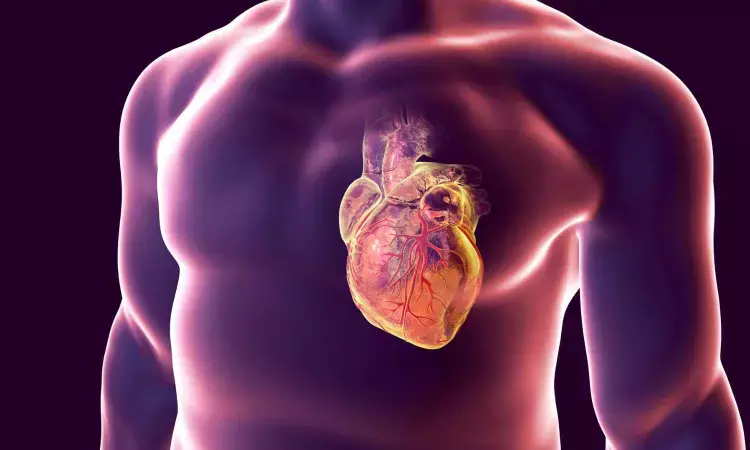- Home
- Medical news & Guidelines
- Anesthesiology
- Cardiology and CTVS
- Critical Care
- Dentistry
- Dermatology
- Diabetes and Endocrinology
- ENT
- Gastroenterology
- Medicine
- Nephrology
- Neurology
- Obstretics-Gynaecology
- Oncology
- Ophthalmology
- Orthopaedics
- Pediatrics-Neonatology
- Psychiatry
- Pulmonology
- Radiology
- Surgery
- Urology
- Laboratory Medicine
- Diet
- Nursing
- Paramedical
- Physiotherapy
- Health news
- Fact Check
- Bone Health Fact Check
- Brain Health Fact Check
- Cancer Related Fact Check
- Child Care Fact Check
- Dental and oral health fact check
- Diabetes and metabolic health fact check
- Diet and Nutrition Fact Check
- Eye and ENT Care Fact Check
- Fitness fact check
- Gut health fact check
- Heart health fact check
- Kidney health fact check
- Medical education fact check
- Men's health fact check
- Respiratory fact check
- Skin and hair care fact check
- Vaccine and Immunization fact check
- Women's health fact check
- AYUSH
- State News
- Andaman and Nicobar Islands
- Andhra Pradesh
- Arunachal Pradesh
- Assam
- Bihar
- Chandigarh
- Chattisgarh
- Dadra and Nagar Haveli
- Daman and Diu
- Delhi
- Goa
- Gujarat
- Haryana
- Himachal Pradesh
- Jammu & Kashmir
- Jharkhand
- Karnataka
- Kerala
- Ladakh
- Lakshadweep
- Madhya Pradesh
- Maharashtra
- Manipur
- Meghalaya
- Mizoram
- Nagaland
- Odisha
- Puducherry
- Punjab
- Rajasthan
- Sikkim
- Tamil Nadu
- Telangana
- Tripura
- Uttar Pradesh
- Uttrakhand
- West Bengal
- Medical Education
- Industry
Orbital atherectomy reasonable strategy for treatment of severely calcified ostial and non-ostial lesions

A study published in Cardiovascular Revascularization Medicine on 20 July 2023 entitled, "Orbital atherectomy safety and efficacy: A comparative analysis of ostial versus non-ostial calcified coronary lesions” by Ghazzal et al. has concluded that there are no significant differences in in-hospital major adverse cardiovascular events or MACE outcomes between patients with ostial versus non-ostial lesions. This indicates that orbital atherectomy, or Orbital atherectomy is a safe and effective treatment option for both lesion types. This also includes those classified as aorto-ostial.
Explaining the study background, they said there needs to be more demonstration on the safety and efficacy of Orbital atherectomy for managing ostial lesions. In this study, researchers evaluated OA treatment of severely calcified ostial and non-ostial lesions in a retrospective analysis of those treated with OA for severely calcified ostial and non-ostial lesions.
The key Results of the study are:
- Researchers identified 609 patients who underwent PCI with OA.
- The participants were 63 % males aged 74 years (mean age).
- 81.9 % of patients had non-ostial lesions.
- The ostial lesions were present in 16.6 % of patients, and 2.8 % were aorto-ostial.
- 1.5 % of patients had unknown lesion anatomy.
- All patients received drug-eluting stent (DES) placement, and the overall freedom from MACE was 98.5 %,
- There was no difference between the ostial and non-ostial groups.
- There were similarities between the groups about freedom from cardiac death and MI.
- Researchers recorded low rates of bleeding complications and severe angiographic complications.
- There was no persistent slow flow/no-reflow reported.
Concluding further, they said our study had limitations like limited generalizability and less experienced non-tertiary centres, analysis of only in-hospital data and no reflection of long-term outcomes of patients.
This study found that using Orbital atherectomy for both ostial and non-ostial coronary artery disease patients was related to favourable in-hospital freedom from major adverse cardiovascular events (MACE) rates, low bleeding rates, and severe angiographic complications.
Further reading:
https://www.sciencedirect.com/science/article/abs/pii/S1553838923007108
BDS, MDS in Periodontics and Implantology
Dr. Aditi Yadav is a BDS, MDS in Periodontics and Implantology. She has a clinical experience of 5 years as a laser dental surgeon. She also has a Diploma in clinical research and pharmacovigilance and is a Certified data scientist. She is currently working as a content developer in e-health services. Dr. Yadav has a keen interest in Medical Journalism and is actively involved in Medical Research writing.
Dr Kamal Kant Kohli-MBBS, DTCD- a chest specialist with more than 30 years of practice and a flair for writing clinical articles, Dr Kamal Kant Kohli joined Medical Dialogues as a Chief Editor of Medical News. Besides writing articles, as an editor, he proofreads and verifies all the medical content published on Medical Dialogues including those coming from journals, studies,medical conferences,guidelines etc. Email: drkohli@medicaldialogues.in. Contact no. 011-43720751


